On November 12, the AiFi Summit 2024 Devcon hosted by GAIB, Codatta, and Kite AI (formerly ZettaBlock) at the Park Hyatt Bangkok has successfully concluded. The AiFi Summit registered over 1,300 participants, with more than 500 attendees. 27 projects and investment institutions, including Paypal, BNB Chain, Base, NEAR Protocol, Story Protocol, 0G, Aethir, io.net, Exabits, Plume, Space and Time, Hyperbolic, Faction, Hashed and Coinbase Ventures, delivered insightful speeches.
Sarah, the Asia-Pacific representative from BNB Chain, delivered the first keynote speech. She mainly introduced the construction of the entire BNB Chain ecosystem, various support policies for developers, and updated the audience on the various progress of BNB Chain in AI applications.
Immediately after, in the second keynote speech, Kony, the CEO of the host GAIB, shared his views on the potential opportunities in the computing power market. He mentioned that AI is the most important era after the mobile internet, and computing power has captured a relatively large proportion of the value in the AI boom. Compared to other financial assets, investing in GPU computing power assets can bring returns that other targets cannot match. However, the current problem in the GPU market is the inability to efficiently connect the two participating parties, one being the operators who have to pay huge financing costs when raising funds to expand GPU scale, and the other being investors who find it difficult to directly invest in computing power assets and can only choose to invest in stocks of semiconductors like Nvidia. GAIB, through the tokenization of computing power assets and their returns, as well as the provision of liquidity, provides investors with more decentralized, more transparent, and AI cash flow-based on-chain assets.
The first roundtable discussion at the AiFi Summit was on "AiFi: Financialization of AI & Compute Assets", where core members from GAIB, Exabits, io.net, Aethir, WitnessChain and Plume teams discussed the current opportunities, challenges and industry regulations in the AiFi sector.
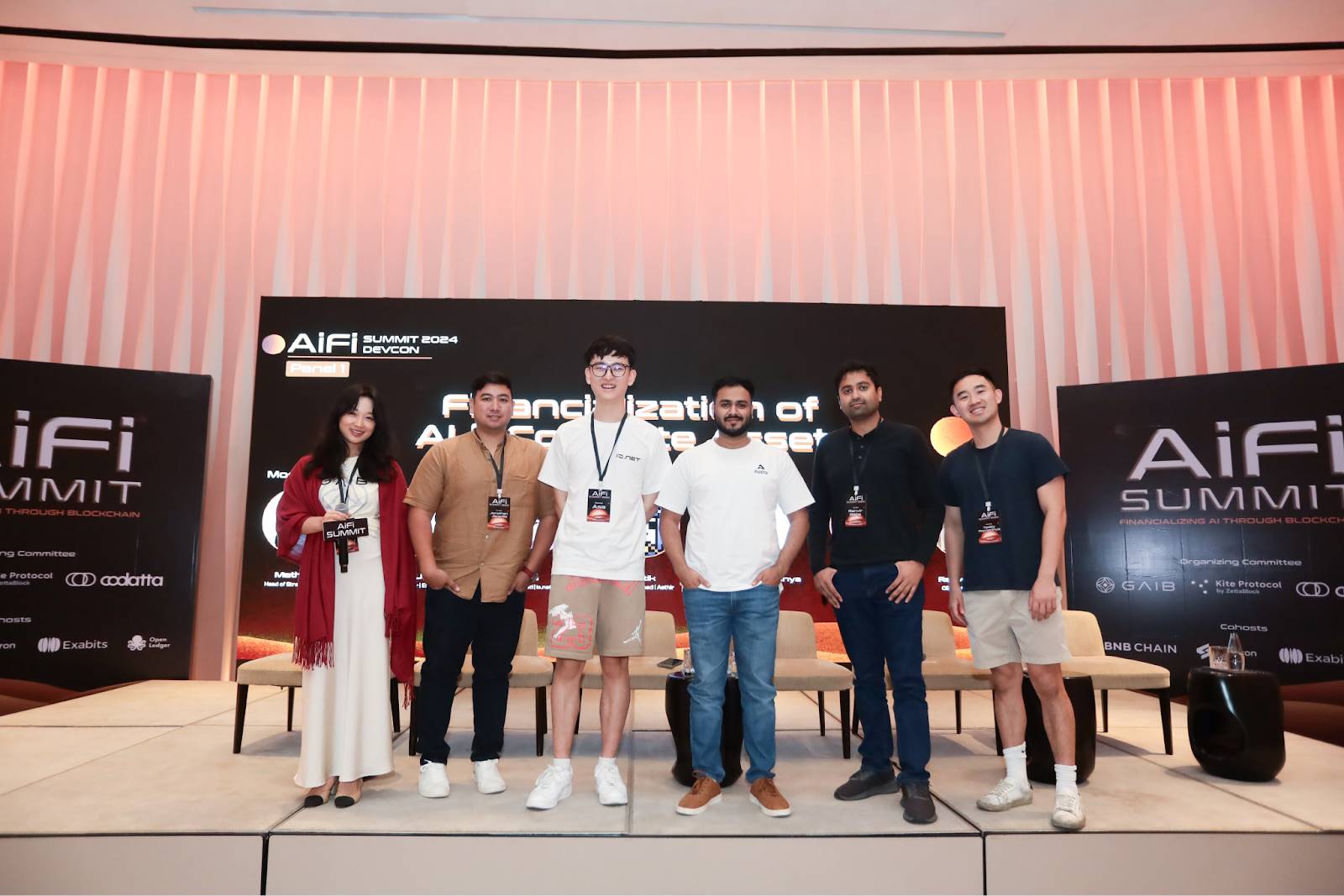
Jonathan, the CIO of Exabits, mentioned that currently, if users want to use GPUs, they can only turn to the major cloud service providers like AWS or Azure, but these platforms tend to serve large enterprises, which limits the development of startups. We need more democratic and open GPU resources to support small and medium-sized enterprises. In the Web3 world, everyone can become a GPU investor to break the computing power monopoly of AWS, which is a huge industry opportunity.
Asa, the Asia-Pacific representative of io.net, mentioned that independent data centers outside the three major cloud providers still have 50% of their GPUs underutilized, and these data centers lack the opportunity to reach users. However, GPUs need to be guaranteed to run continuously, and also face maintenance issues. How to build an incentive mechanism to ensure the interests of investors and other participants is a major challenge in the AiFi track.
Kartik, the ecosystem manager of Aethir, mentioned that the entire system has demand for computing power, computing power operators, and investors at the same time. How to convince them to participate in a market that runs on on-chain mechanisms, and how to ensure the needs of all parties, are full of challenges. The regulatory risk lies in the fact that in some countries and regions, using tokens to incentivize data center services may cause certain troubles, so it is necessary to define the compliance boundaries in the customer agreement.
Ranvir, the co-founder and CEO of WitnessChain, proposed that computing power as a new asset requires a new pricing mechanism. Computing power does not have a unified formula to calculate its commodity price, and different platforms and different GPUs have cost and performance differences, and GPUs with different performance participating in the same task will have different contributions, which creates design opportunities for new financial mechanisms.
Teddy, the CBO of Plume, also mentioned that when a new asset appears, we need to be cautious about regulation. There is already a certain compliance framework for AI-related assets to make asset transactions formal and feasible, which is also what Plume is doing to help ecosystem projects.
In the following keynote speech, Yi, the CEO of Codatta, explained to the audience how decentralized data trading can drive AI towards AGI, and Codatta's position and mission in this process. He mentioned that only vertical domain data can improve the reasoning and planning capabilities of basic models in specific domains, and only by collecting a large amount of data from different vertical domains can AGI be realized. As data contributors, the data we provide can actually be applied to multiple different scenarios, and each scenario will have different companies to commercialize it, which means that the vertical domain data we provide will bring in revenue over time, which is why we see data as an asset. It is for this reason that we need to make data asset trading easier and able to obtain relatively fair pricing in the market.
The second roundtable discussion focused on the Open Data Economy, where core members from projects such as Spheron, Theoriq, Space and Time, Hyperbolic, Base and Nevermined discussed the current state of the AI data ecosystem, supporting infrastructure, and future ecosystem needs.
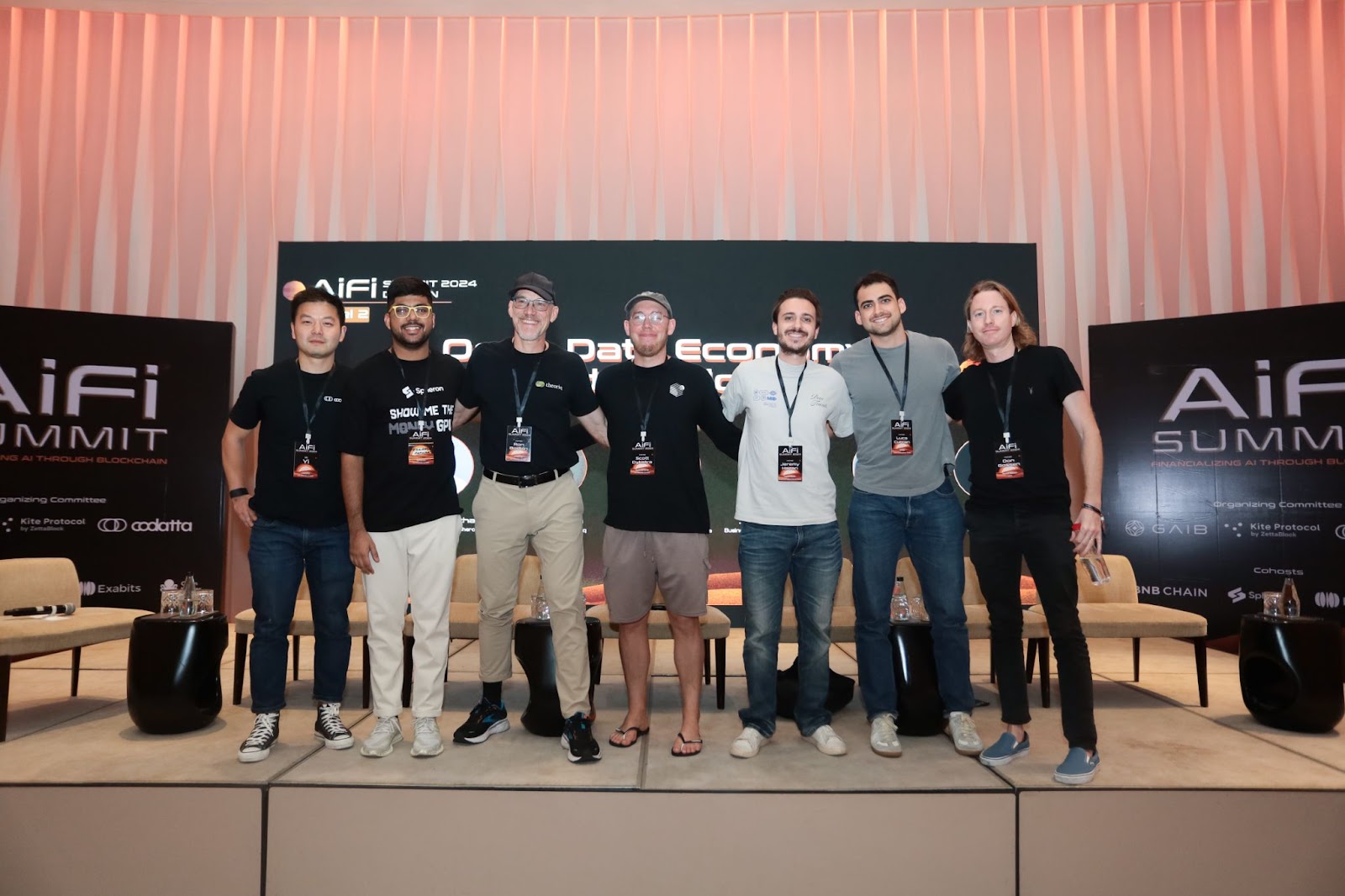
Ron, the co-founder and CEO of Theoriq, mentioned that we are currently seeing many applications beyond simple chatbots, such as governance bots on DAOs. These applications involve the collaboration of multiple agents, and in addition to the crypto field, these applications are also increasingly appearing in scenarios such as marketing and analysis. Many people think the biggest use of data is to train models, but we see that data is playing an increasingly important role in the decision-making process, and different agents acquiring different data and collaborating can create the greatest value.
Scott, the co-founder and CTO of Space and Time, said that Space and Time is currently using smart contracts to build a rule engine for agent systems, which can allow agents to use your funds in a trustless environment and achieve the ideal on-chain agent form. Space and Time's product can allow users to query the historical behavior of agents and formulate strict execution policies for agents.
Don, the CEO of Nevermined, believes that to succeed in the data market, two conditions are needed: one is to form a monopoly on data transactions, and the second is to restrict data assets to prevent contributors from uploading meaningless assets. A feasible approach is to build corresponding analytical tools around data assets in specific scenarios, which can maximize the extraction of data value and profitability.
As one of the hosts, Chi, the CEO of Kite AI, delivered a keynote speech announcing the brand upgrade and the launch of the new Kite AI artificial intelligence platform during the summit. She discussed the difficulties in the development of centralized AI, and how Kite AI's solutions can expand the boundaries of AI. She mentioned that due to the lack of data distribution channels and data ownership confirmation mechanisms, a large amount of personal data and even corporate data are difficult to be utilized by large models. Over the past year, the proportion of open-source licensed datasets on the Internet has dropped from 95% to 75%, making it difficult for model training companies to obtain the best quality data for their models, and also difficult to make breakthroughs in model performance. The industry needs decentralized AI solutions to access more valuable data.
In the third roundtable discussion, team members from GM Network, Mind Network, 0G Labs, NEAR Protocol and Chainbase discussed topics such as how Web3 companies can participate in AI competition, data privacy, and application implementation.
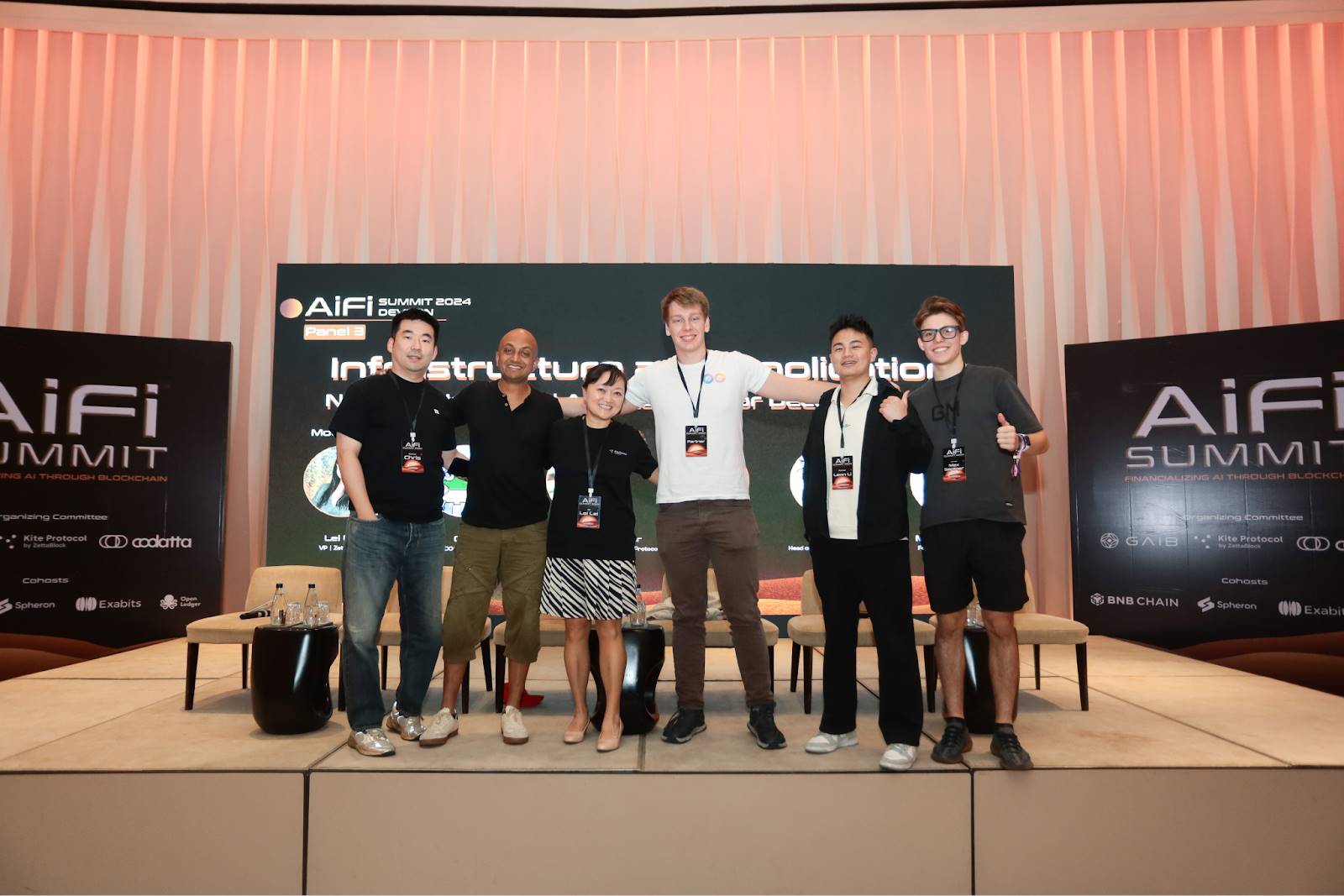
Max, a founding team member of GM Network, mentioned that users have been generating a large amount of data, but this data has not been well utilized, causing the data to lose its value. We need to combine the collected data with AI to make smart devices more intelligent.
Leon, the Asia-Pacific representative of Mind Network, mentioned that although there is no perfect data privacy protection measure in reality, perhaps a combination of different methods can explore a feasible solution. To protect user privacy, Mind Network is currently encrypting at three different levels: encrypting data in distributed storage, encrypting through fully homomorphic encryption in the GPU computing process, and encrypting at the application layer.
Chris, an AI researcher at 0G Labs, mentioned that in traditional AI models, even if they are open-source, it is difficult for us to know what data was used in the training, and we do not know how they will perform in new scenarios, which makes the model results difficult to trust. 0G has a good data storage infrastructure, and data can be directly loaded from the cloud to the training process, and in the future, it can realize the construction of safer and more reliable models through personal verification of the data.
Chris, the COO of Chainbase, mentioned that there are currently two narratives in the market, one is crypto for AI, and the other is AI for Crypto. Utilizing crypto to solve the problems of large companies controlling data, computing power, and models has been discussed a lot. But recently, there have been many use cases of AI for Crypto, such as truth terminal and AI payment, and more and more projects are starting to cooperate and support the AI ecosystem. Users are very concerned about whether they can make money from the data, and the key task of the platform is to solve how to distribute the benefits between data contributors and consumers. Developers are not a group driven by vision, the most important thing is to help them save time and make money.
In the subsequent keynote speech, Bu Fan, the Head of IPFi at Story Protocol, and Prakarsh, the Ecosystem Manager at Spheron, shared their views on the decentralization of AI asset-ization and how their organizations are adapting to this trend.
Bu Fan mentioned that there are already many landing scenarios in the market where AI is combined with Crypto. The first is user-facing chatbots, where creators create AI characters and issue commercial licenses on the chain; the second is AI meme coins, where creators can legally connect to the source IP assets on the chain and release tokens; the third is providing model training data (such as pictures), which can be continuously monetized through royalties collected on the chain. But these are only very early applications, and the models have not yet taken shape, so creators can continue to explore scenarios where AI and Crypto are combined. Story Protocol focuses on standardizing IP activities through token standards and disseminating IP in different forms.
Prakarsh mentioned that in the AI era, computing power will become the underlying anchoring asset for most agents and most AI applications. Distributed computing power will have many application scenarios, and they currently see more potential scenarios, including knowledge sharing between hospitals while protecting data privacy, and AI dialogue systems based on local computing power and models, ultimately forming a personal AI system.
The fourth roundtable focused on how to connect the Crypto and AI worlds, and investors discussed the problems faced by centralized AI systems and where Crypto+AI can break through.
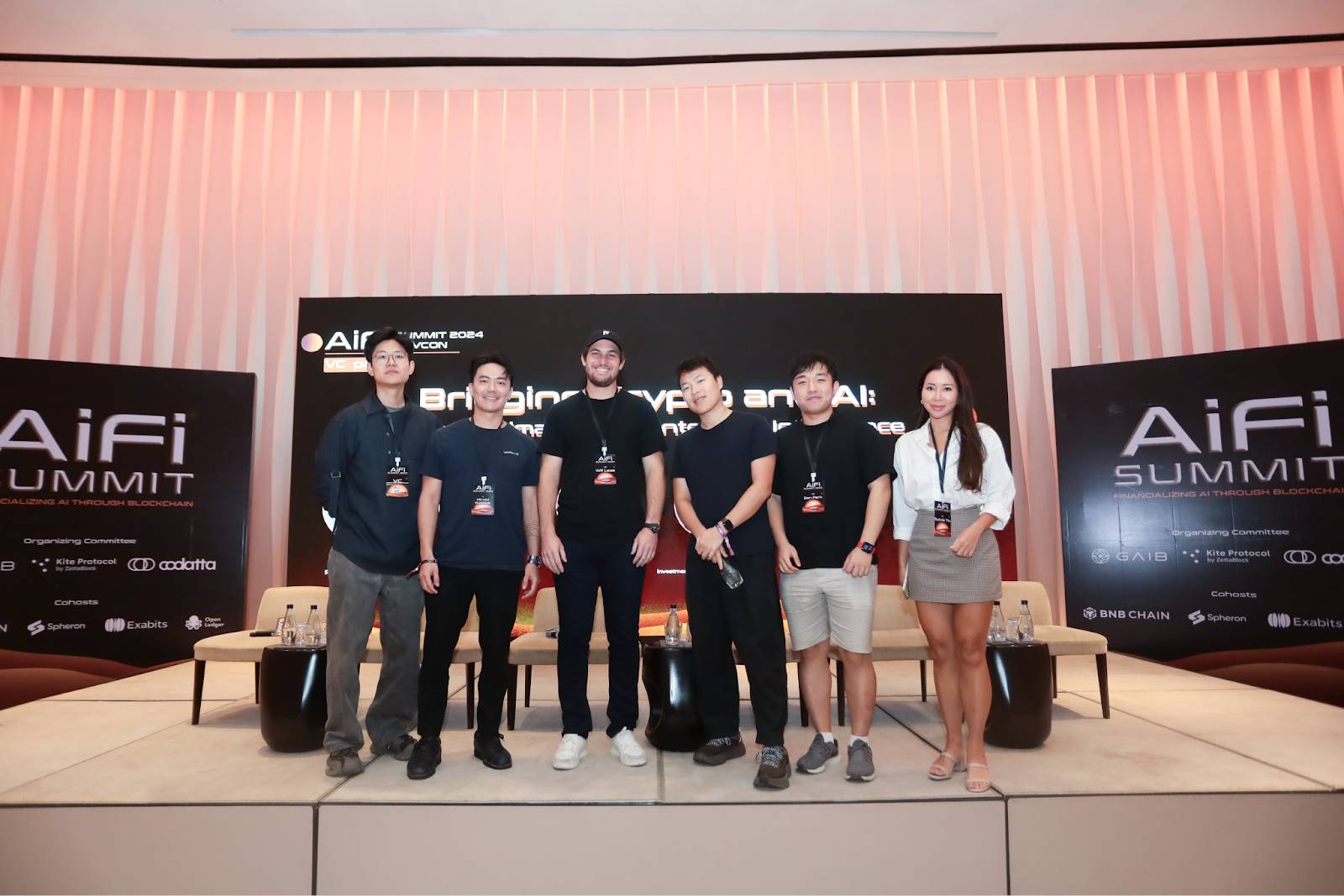
Hiroki, the Head of Research at Lemniscap, pointed out that there are two difficulties in building a decentralized AI network: one is that the scalability of the distributed computing power network is difficult to compete with centralized competitors, and the other is that the quality of personal data contributions is difficult to control.
Will, an investment partner at Faction, said that you can currently let AI plan your entire vacation, but the plan cannot be implemented because AI currently cannot help you make payments. Will believes that AI agents need to have crypto wallets, and crypto wallets will play the role of bank accounts, and the payment technology stack will have huge opportunities, as all financial transactions will have to flow through these agents.
Ryan, an investment partner at Coinbase Ventures, believes that most models can only access public data, and cannot access sensitive private data such as finance and medical data. Crypto can promote model access to private data pools and improve AI performance in specific fields. Agent systems currently cannot complete very complex tasks, as they do not actually know how to understand the content of smart contracts and take action. We need large models that can acquire, understand, and provide human-readable interpretations of smart contracts.
Dan, an investor at Hashed, pointed out that the current incentive system for distributed AI is not very perfect, and in the entire AI value chain, only a few people have made relatively large positive contributions, but their contributions are not reflected in the incentives. The lack of a good distribution mechanism has led to unfair distribution. In addition, the models owned by the community must be secure and controllable, and the ownership of the parameters should be returned to the community for research, rather than providing a black box like centralized companies. If the model involves scenarios such as emotional companionship, it should be governed more in an open environment.
Sylvia, the Director at Bullish Capital, mentioned that the incentive model design process must fully consider what the underlying demand is. For example, if edge devices are needed, it must be considered how to find them among the many distributed computing devices. Therefore, before figuring out the model architecture optimization problem, it is impossible to design a truly effective incentive model.
The above is a complete review of the highlights of AiFi Summit 2024 Devcon. Even facing challenges such as regulation and incentive mechanisms, the AiFi track is also full of opportunities. With the new highs in the overall market and the all-round heat of the AI track, the industry is generally in a positive state, with a continuous influx of talents and more and more innovations emerging.
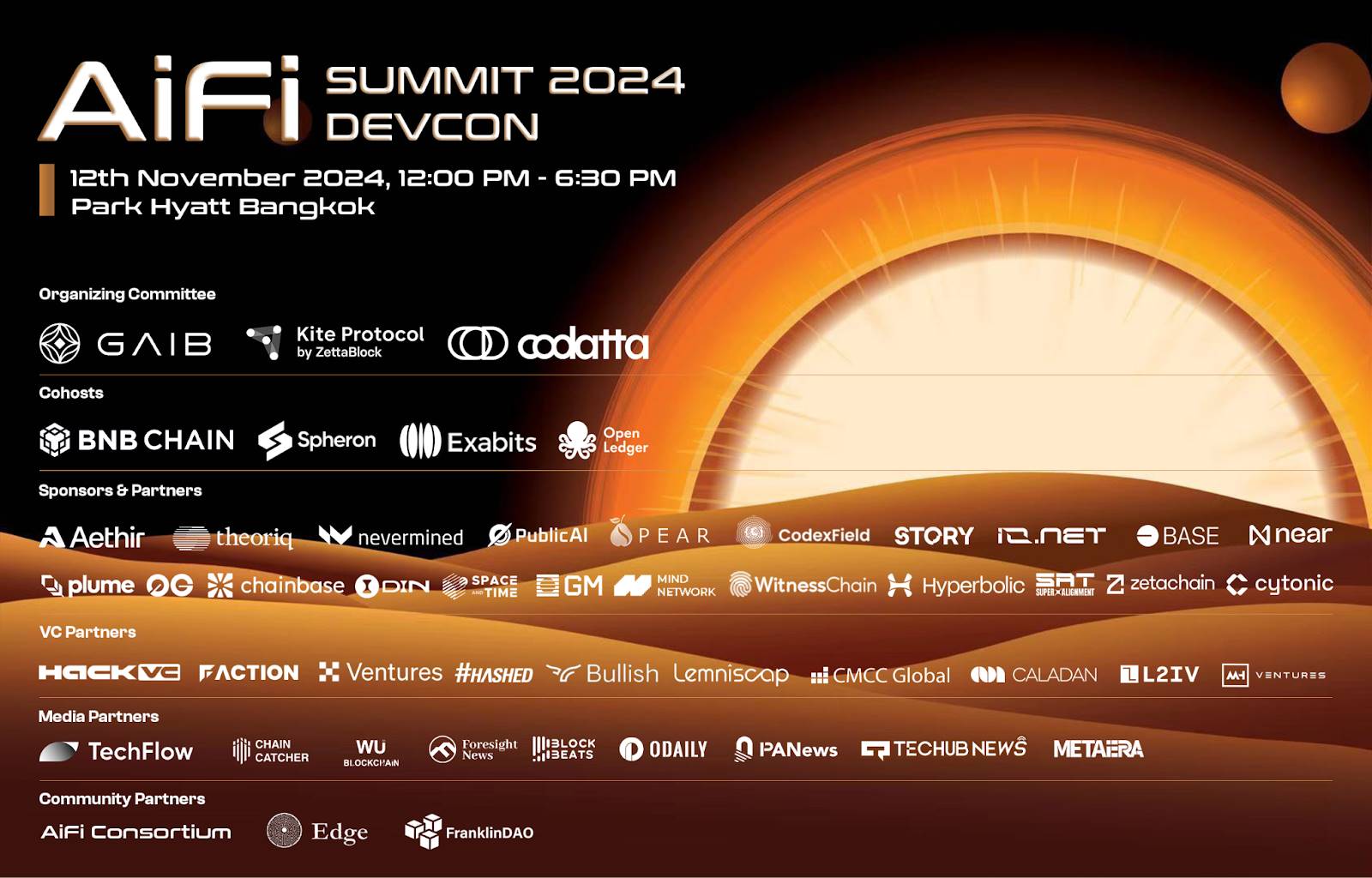
For more content, please follow
GAIB: https://x.com/gaib_ai
Codatta: https://x.com/codatta_io
KITE AI: https://x.com/GoKiteAI








